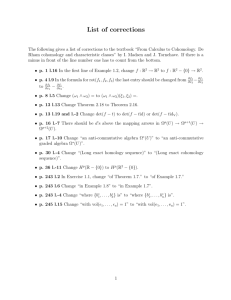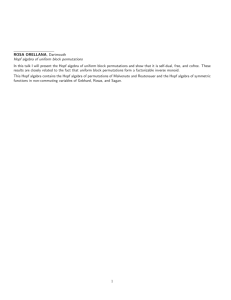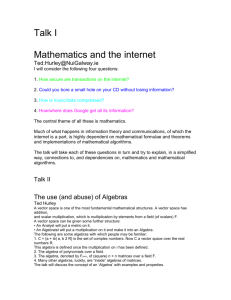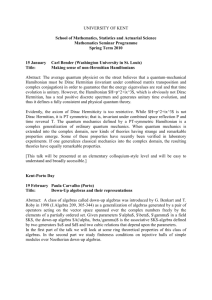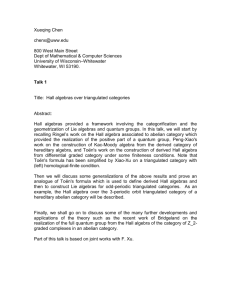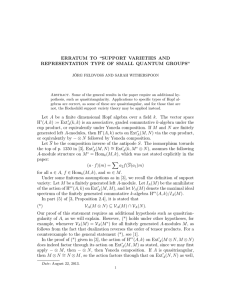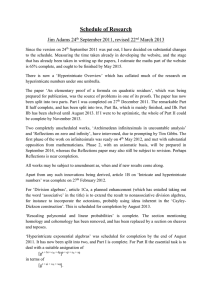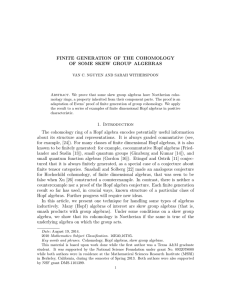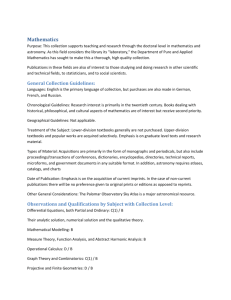Cohomology of Hopf Algebras
advertisement
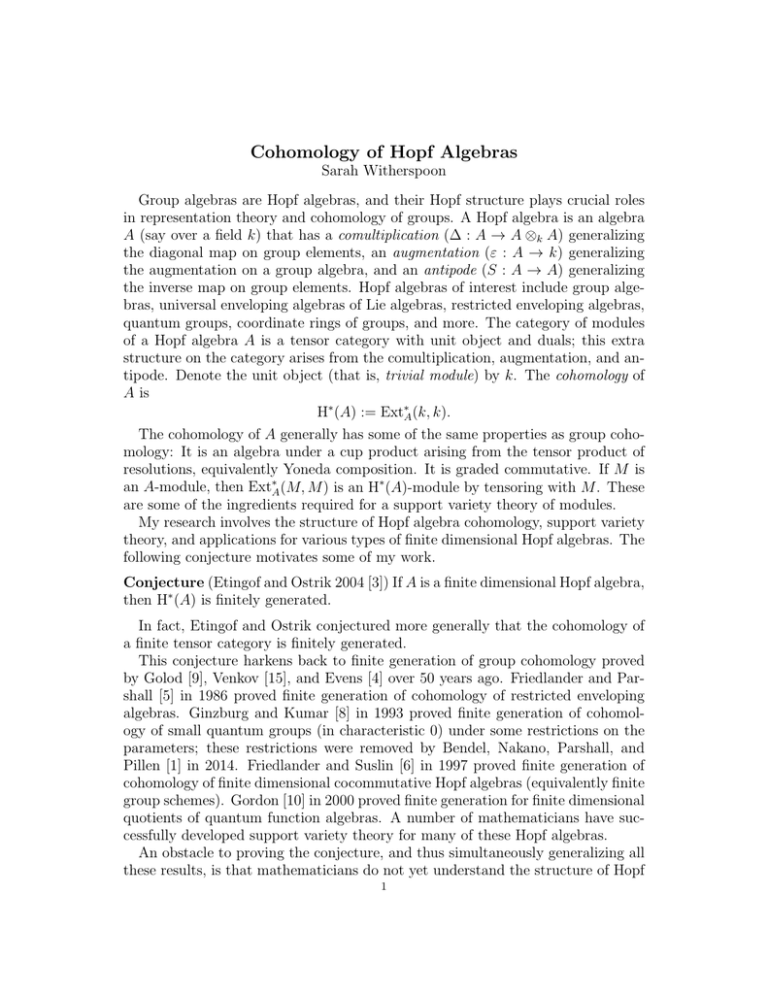
Cohomology of Hopf Algebras Sarah Witherspoon Group algebras are Hopf algebras, and their Hopf structure plays crucial roles in representation theory and cohomology of groups. A Hopf algebra is an algebra A (say over a field k) that has a comultiplication (∆ : A → A ⊗k A) generalizing the diagonal map on group elements, an augmentation (ε : A → k) generalizing the augmentation on a group algebra, and an antipode (S : A → A) generalizing the inverse map on group elements. Hopf algebras of interest include group algebras, universal enveloping algebras of Lie algebras, restricted enveloping algebras, quantum groups, coordinate rings of groups, and more. The category of modules of a Hopf algebra A is a tensor category with unit object and duals; this extra structure on the category arises from the comultiplication, augmentation, and antipode. Denote the unit object (that is, trivial module) by k. The cohomology of A is H∗ (A) := Ext∗A (k, k). The cohomology of A generally has some of the same properties as group cohomology: It is an algebra under a cup product arising from the tensor product of resolutions, equivalently Yoneda composition. It is graded commutative. If M is an A-module, then Ext∗A (M, M ) is an H∗ (A)-module by tensoring with M . These are some of the ingredients required for a support variety theory of modules. My research involves the structure of Hopf algebra cohomology, support variety theory, and applications for various types of finite dimensional Hopf algebras. The following conjecture motivates some of my work. Conjecture (Etingof and Ostrik 2004 [3]) If A is a finite dimensional Hopf algebra, then H∗ (A) is finitely generated. In fact, Etingof and Ostrik conjectured more generally that the cohomology of a finite tensor category is finitely generated. This conjecture harkens back to finite generation of group cohomology proved by Golod [9], Venkov [15], and Evens [4] over 50 years ago. Friedlander and Parshall [5] in 1986 proved finite generation of cohomology of restricted enveloping algebras. Ginzburg and Kumar [8] in 1993 proved finite generation of cohomology of small quantum groups (in characteristic 0) under some restrictions on the parameters; these restrictions were removed by Bendel, Nakano, Parshall, and Pillen [1] in 2014. Friedlander and Suslin [6] in 1997 proved finite generation of cohomology of finite dimensional cocommutative Hopf algebras (equivalently finite group schemes). Gordon [10] in 2000 proved finite generation for finite dimensional quotients of quantum function algebras. A number of mathematicians have successfully developed support variety theory for many of these Hopf algebras. An obstacle to proving the conjecture, and thus simultaneously generalizing all these results, is that mathematicians do not yet understand the structure of Hopf 1 2 algebras well enough. Work on the conjecture thus far has involved investigations for many different specific types of Hopf algebras. As a cautionary remark, an analogous conjecture of Snashall and Solberg [14], involving Hochschild cohomology of finite dimensional algebras, has a counterexample found by Xu [16]. In [11] with Mastnak, Pevtsova, and Schauenburg, we proved the conjecture for finite dimensional pointed Hopf algebras with abelian groups of grouplike elements (in characteristic 0) under some conditions on the parameters. Pointed Hopf algebras are those whose duals are basic algebras, and they include the small quantum groups. They have underlying algebra structure that of deformations of skew group algebras. In [12] with Nguyen, we proved the conjecture for some types of Hopf algebras in positive characteristic whose underlying algebra structure is that of a skew group algebra. As special cases of some of these Hopf algebras (in characteristic 0), there is a quantum analog of elementary abelian groups whose cohomology is easily seen to be finitely generated. In [13] with Pevtsova, we developed support variety theory for these quantum elementary abelian groups and proved a tensor product theorem, that is, V (M ⊗ N ) = V (M ) ∩ V (N ) for finite dimensional modules M, N of a quantum elementary abelian group A, where V (−) denotes the variety. (These support varieties are defined in the usual way, as maximal ideal spectra of quotients by annihilators of Ext∗A (M, M ) in H∗ (A).) We classified ideals in the stable module category as an application of the support variety theory. With Feldvoss in [7], we developed a support variety theory more generally for finite dimensional Hopf algebras. The theory was sufficiently strong to prove some standard results on representation type in the case that the Hopf algebra is quasitriangular (i.e. a tensor product of modules is commutative up to isomorphism), a condition that quantum groups satisfy. We used the containment V (M ⊗N ) ⊂ V (M )∩V (N ) that holds generally for quasitriangular Hopf algebras, as well as a standard relationship between complexity and varieties of modules. With Benson in [2], we showed that there are some Hopf algebras whose support variety theory behaves quite differently from that of finite groups. In particular, we constructed Hopf algebras A from pairs of finite groups for which there are modules M, N such that V (M ⊗ N ) 6= V (M ) ∩ V (N ), and in fact we have examples showing that neither containment holds in general. We have examples of nonprojective modules for which a tensor power is projective. These examples are special cases of a general construction of Hopf algebras A := kH ⊗k k[G] 3 where G, H are finite groups with G acting on H. That is, the underlying algebra structure of A is just a tensor product of the group algebra kH with the coordinate ring k[G] of G. Comultiplication involves the group action, leading to noncommutativity of the tensor product of modules, and to the unusual behavior mentioned above. Nonetheless, there is a reasonably well-behaved support variety theory, based on that of finite groups, that we used to classify ideals in the stable module category. This work is only a beginning; it shows plainly that there is much more to do in order to understand cohomology and varieties for modules of finite dimensional Hopf algebras generally. The potential rewards are great, as there are usually many applications of support varieties to representation-theoretic questions. References [1] C. P. Bendel, D. K. Nakano, B. J. Parshall, and C. Pillen, Cohomology for quantum groups via the geometry of the nullcone, Mem. Amer. Math. Soc. 229 (2014), no. 1077. [2] D. J. Benson and S. Witherspoon, Examples of support varieties for Hopf algebras with noncommutative tensor products, Archiv der Mathematik 102 (2014), no. 6, 513–520. [3] P. Etingof and V. Ostrik, Finite tensor categories, Mosc. Math. J. 4 (2004), no. 3, 627–654. [4] L. Evens, The cohomology ring of a finite group, Trans. Amer. Math. Soc. 101 (1961), 224–239. [5] E. Friedlander and B. Parshall, Cohomology of infinitesimal and discrete groups, Math. Ann. 273 (1986), 353–374. [6] E. Friedlander and A. Suslin, Cohomology of finite groups schemes over a field, Invent. Math. 127 (1997), no. 2, 209–270. [7] J. Feldvoss and S. Witherspoon, Support varieties and representation type of small quantum groups, Int. Math. Res. Not. (2010), no. 7, 1346–1362. Erratum, to appear in Int. Math. Res. Not. [8] V. Ginzburg and S. Kumar, Cohomology of quantum groups at roots of unity, Duke Math. J. 69 (1993), no. 1, 179–198. [9] E. Golod, The cohomology ring of a finite p-group, Dokl. Akad. Nauk SSSR 235 (1959), 703–706. [10] I. Gordon, Cohomology of quantized function algebras at roots of unity, Proc. London Math. Soc. (3) 80 (2000), no. 2, 337–359. [11] M. Mastnak, J. Pevtsova, P. Schauenburg, and S. Witherspoon, Cohomology of finite dimensional pointed Hopf algebras, Proc. London Math. Soc. (3) 100 (2010), no. 2, 377–404. [12] V. C. Nguyen and S. Witherspoon, Finite generation of the cohomology of some skew group algebras, Algebra and Number Theory 8 (2014), no. 7, 1647–1657. [13] J. Pevtsova and S. Witherspoon, Tensor ideals and varieties for modules of quantum elementary abelian groups, to appear in Proc. Amer. Math. Soc. [14] N. Snashall and Ø. Solberg, Support varieties and Hochschild cohomology rings, Proc. London Math. Soc. (3) 88 (2004), no. 3, 705–732. [15] B. B. Venkov, Cohomology algebras for some classifying spaces, Dokl. Adad. Nauk SSSR 127 (1959), 943–944. [16] F. Xu, Hochschild and ordinary cohomology rings of small categories, Adv. Math. 219 (2008), no. 6, 1872–1893.
